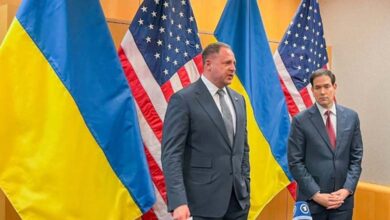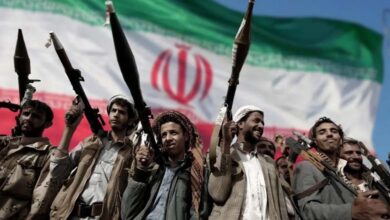Terrorist Groups Exploit Concepts and Terminologies to Persuade Youth to Join Them… Learn About the Most Important Ones

Journalist and media presenter Dalia Abdelrahim, host of the program “The Other Side” and Vice President of the News Channels Sector at the United Media Services Company, addressed the issue of political Islam, highlighting the concepts and terminologies used by terrorist and extremist groups claiming to represent Islam, those concepts they use to convince young people to join them.
Among the concepts discussed are the concepts of loyalty, disavowal, jihad, Sharia, sovereignty, and others, upon which terrorist and extremist groups rely in their political discourse in an attempt to blur the political with the religious and vice versa. Especially since these groups always use catchy and deceptive slogans to deceive others and promote these slogans to gain supporters or at least garner sympathy from others.
Abdelrahim added, during the presentation of her program “The Other Side,” aired on “Al-Qahera News,” that this is not new for these groups in general, as they drew it from heritage; the Khawarij sect, which left Imam Ali, may God be pleased with him, and the group of Muslims claimed that their departure from Imam Ali, may God be pleased with him, was a legitimate matter; they dubbed themselves as “Khawarij” and saw it as praise.
She continued, saying: “The word Khawarij, in their view, means “departure,” i.e., the sect that departs for jihad in the name of God, and they base this on interpreting Quranic verses to describe themselves, as has been the case since what was called the Islamic awakening in the late seventies of the last century until now. When one of their members is described as a terrorist, he tells you yes, we are terrorists according to the Quranic description to us, and he relies on the verse “And prepare against them whatever you are able of power” to summarize Islam in his group and team by renouncing political leadership or, in their terms, the emir.”
The Egyptian journalist also pointed out that: “Every organization among the extremist organizations has tried, in the modern age, to give itself a title or a name that distinguishes it from others, while at the same time carrying an Islamic connotation that affects the mind; so that some naive young people are deceived by this title and get involved in this group or organization voluntarily, thinking that whoever does not join them will leave a lot of good, and will suffer a painful punishment from Almighty God. These organizations also attribute to the titles many acceptable characteristics in the minds of the recipients, such as “the people of faith,” “the saved group,” or that they alone are the ones who fight for the truth, and the fighters in the path of God, or the strangers in the era of disbelief.”
She continued: “Among the issues and problems that concern these groups and promote them is the issue of “governance system,” where these groups claim that there is an Islamic governance system and make it a basis of belief, thereby attracting a large number of youth by using this system.”
Terrorist Groups and the Spread of Unrest: The Gabon Coup Raises Regional Concerns
She emphasized that there are a number of concepts misused by terrorist groups, and the first among them is the caliphate and empowerment, where the Islamic caliphate or the great imamate is a governance system based on the succession of a Muslim leader over the Islamic state to rule it by Islamic law, it is a sufficiency principle for the Sunnis, and it is called caliphate because the caliph is the one who succeeds the Prophet to lead the Muslims, specifying that the second of these concepts is empowerment for extremist groups.
Which they used to establish their control and impose their ideas by calling it the empowerment phase in the stages of homeland theft; their goal is not to establish religion but to impose their religious ideology through political coloring, although it is agreed that it is a non-binding historical context, in addition to the term of ignorance, which is an Islamic term mentioned in the Medinan surahs of the Quran, which refers to the life of nations before Islam, and links it to the ignorance of those nations on the religious level, which is an indication not specific to the Arabs only, but includes all peoples before the mission of the Prophet Muhammad, it is a definition more than a condemnation of these societies.
She then mentioned the term of ignorance of Muslim societies, which the extremist takfiri groups used for Muslim societies in an attempt to attach the label of disbelief to these societies, and then impose the judgments of disbelief on these societies; these organizations approached their description of contemporary Muslim societies and others that refused Islam and fought its people, in addition to the term of takfir, which is attributing disbelief to one of the Muslims, taking him out of the nation of Islam, and the beginning of the appearance of the term is linked to the Battle of Siffin and the emergence of the Khawarij sect who believed in the disbelief of Imam Ali ibn Abi Talib and those with him for accepting arbitration, all Islamic doctrines prohibit this, as it is one of the issues that encourage difference and division.
The last of these terms, according to Abdelrahim, is the takfir of political differences, where takfiri and extremist groups launched the term of takfir on everyone who differs with them politically and religiously, to the point that they became known for this characteristic, as they declare disbelief for everyone, and they went to the extreme in takfir, declaring disbelief for whoever does not rule by the disbelief of the ruler and those who differ with them, and consequently, they kill people according to their judgment of declaring them disbelievers.












